The first day of shutdown negotiations has been a bust.
While President Trump met Saturday at the White House with some of the Republicans who talked him into a border wall-fueled shutdown, Congress spun its wheels.
The House gaveled into session and Speaker Paul D. Ryan immediately put the chamber into a recess, blocking any attempts at floor action. The Senate was in session a little longer, notching more than three hours of mostly empty floor time.
Majority Leader Mitch McConnell closed out the session by saying he was sending lawmakers home for Christmas, and would next hold a full session on Thursday — signaling the shutdown will last at least until then.
“It’s really simple,” the Kentucky Republican said. “Sixty votes in the Senate, a majority in the House and President Trump’s signature. That’s what we need.”
But the two sides appear to be moving further apart, not closer.
The president canceled his plans to head to Florida for Christmas, and the White House announced the first lady would return — she’d gone ahead of him — to spend the holiday here.
Mr. Trump warned on Twitter of “a long stay.”
And Senate Minority Leader Charles E. Schumer said Mr. Trump must give up his dream of more border wall before Democrats will accede.
“If you want to open the government, you must abandon the wall, plain and simple,” the New York Democrat said on the Senate floor Saturday.
Democrats are convinced the president, who for months has threatened to orchestrate a government shutdown, will be blamed by voters.
Mr. Trump, for his part, said there was a lot of “fake news” about the shutdown, but didn’t say what in particular he objected to about the coverage.
More than 25 percent of the government that’s funded by discretionary spending ran out of money at midnight.
Given the weekend and the upcoming holidays for Christmas Eve and Christmas — Mr. Trump declared Dec. 24 a holiday this year — the real effects won’t be felt by most government workers until Wednesday.
About 800,000 employees are in the departments and agencies that lost funding. Of those, 420,000 are deemed essential enough to have to continue working — though they won’t be paid until the shutdown ends. The other 380,000 are to be furloughed.
The Senate on Friday passed a bill to guarantee those furloughed workers will still be paid for the time they were out of work.
That legislation has not passed the House, though every previous major shutdown has ended with workers being given backpay for time they didn’t work.
The chief sticking point in negotiations is Mr. Trump’s demand for $5 billion in border wall money.
The White House had signaled earlier this week he would sign a bill without it, but he reversed himself on Thursday and vowed a veto unless he got his money.
Most Republicans have rallied around Mr. Trump, while Democrats appear nearly unanimous in their opposition to him.
• Stephen Dinan can be reached at sdinan@washingtontimes.com.




Please read our comment policy before commenting.